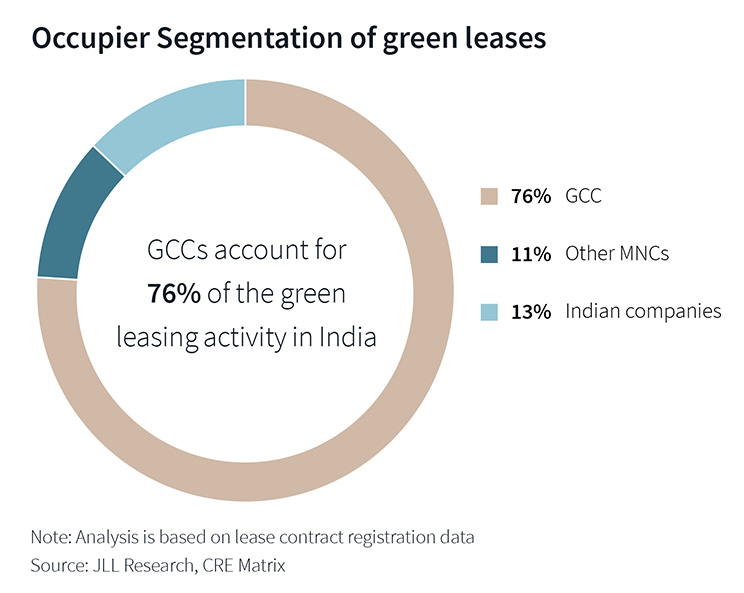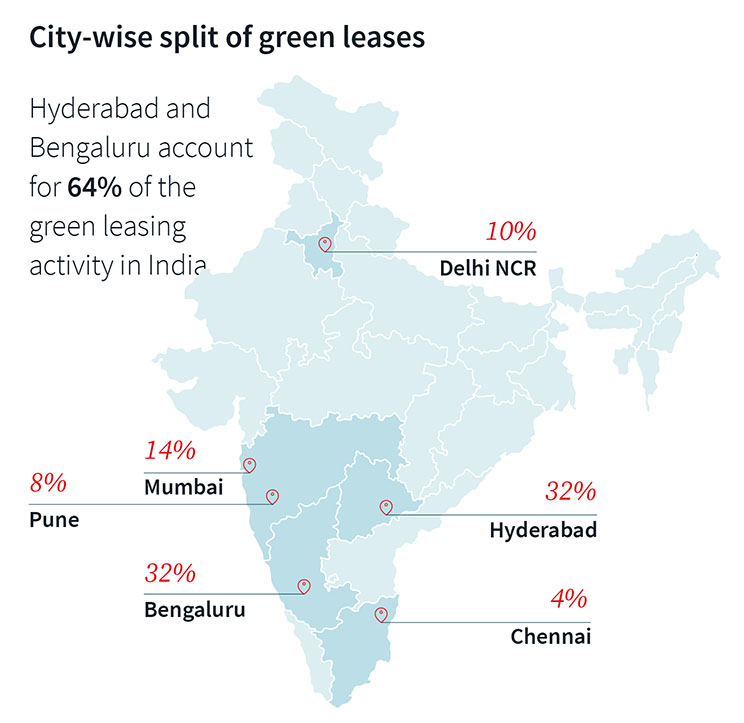Green Leasing: A JLL-CRE Matrix Report
Paving the way towards sustainable real estate in India
- Samantak Das
- Ankit Bhartiya
- Rohan Sharma
- Ketan Bhingarde
Sustainability has now firmly been incorporated into the board room agenda. As firms across the world look to create a roadmap towards their net zero carbon commitments, various strategies are being devised to reduce carbon emissions from the built environment. Green building certifications and green leases play a crucial role in this endeavour. We continue to see occupiers transitioning from chasing sustainability certifications to emphasizing on sustainability reporting. This transition rests on the reform of the current leasing system – from ‘traditional leases’ to ‘collaboration-based green leases’, enabling data sharing between building owners and occupiers.
Green coverage increased from 39% in 2020 to 53% in 2023
The Indian real estate market is making significant strides towards sustainability and the increase in green-certified office penetration is a clear indication of this progress. Importantly, there is strong evidence of a 9-13% rental premium and a 300-500 bps higher occupancy level in green-certified assets.
Increased adoption of green leases post-COVID; widespread adoption is still distant
There has been a significant increase in the adoption of green leases in India’s office market. Amidst the amplified focus on sustainability in the post-pandemic era, the share of green leasing quadrupled during the 2022-2023 period, compared to the pre-COVID years of 2018-2019. This surge clearly demonstrates the collaboration between asset owners and occupiers to encourage responsible leasing practices. While the beginnings of change are already evident, India still has a long road to travel on the green lease continuum.
Global occupiers lead the way in sustainable practices
Global occupiers and institutional landlords are at the forefront of sustainable practices, with GCCs accounting for 76% of the overall green leasing activity in India. Moreover, it comes as no surprise that the two largest GCC markets - Hyderabad and Bengaluru - lead the adoption of green leasing practices, accounting for 64% of the overall green leasing in India.
Waste management, energy efficiency and data sharing are key aspects
Green leasing clauses mainly focus on waste management, energy efficiency and data sharing aspects. Waste management and recycling obligations find their way into most green lease agreements and some standard lease agreements as well. Also, energy efficiency is an important instrument towards reducing a building’s carbon footprint and hence, multiple clauses are centred around it.
Outlook
Looking ahead, green building certification will become a de-facto requirement for prominent occupiers in their selection of office spaces. As occupiers integrate environmental, social, and governance (ESG) factors and net zero carbon (NZC) targets into their decision-making, the green lease contract will play a crucial role. It will go beyond basic energy conservation ambitions to include clauses related to social value and good governance. Occupiers and landlords will engage in active mission-aligned collaboration throughout the life of the lease with measurable goals and corresponding KPIs to ensure desired outcomes. Importantly, a building’s value will increasingly rely on its environmental performance, and collaborative green leases will be a critical part of asset management strategies.

